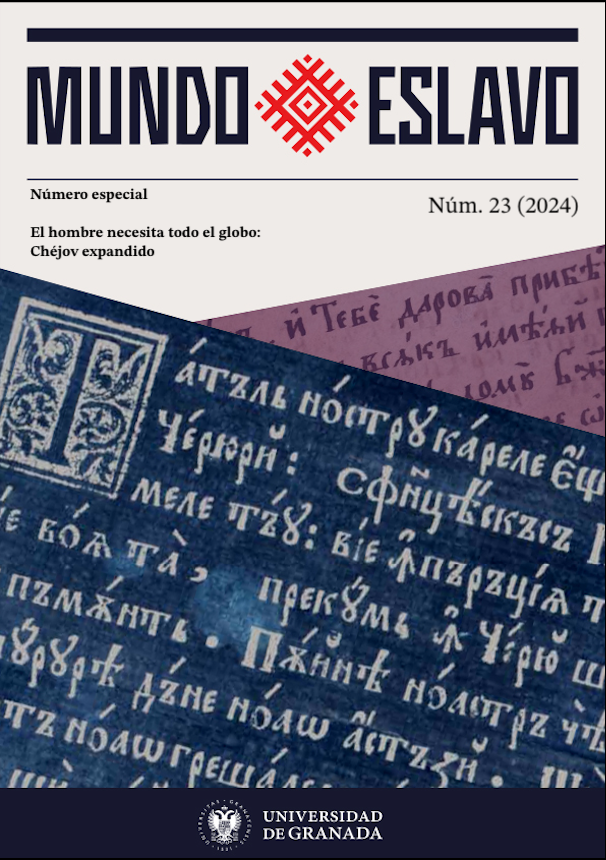La cuestión de la responsabilidad ética en la narración ficticia «Los huevos fatales», de Mijaíl Bulgákov
DOI:
https://doi.org/10.30827/meslav.23.30630Palabras clave:
Bulgakov, Los huevos fatales, narrativa ficticia, responsabilidad ética, distopíaResumen
La cuestión de la responsabilidad en relación con los resultados de la investigación científica no solo se extiende al científico que lleva a cabo un estudio y se da cuenta de su potencial para la aplicación práctica, sino también a quienes participan en la puesta de los resultados del estudio en práctica. La prosa de Bulgakov «Los huevos fatales» subraya estas dos líneas de responsabilidad asociadas con consideraciones éticas. El investigador evalúa cuidadosamente los riesgos potenciales, pretende adherirse a los principios de precaución y, en primer lugar, trata de comprender los mecanismos exactos que subyacen a los notables resultados de su descubrimiento accidental. Sin embargo, el descubrimiento se aleja de él cuando cae en manos de un ejecutor. Este implementador, impulsado por la prisa, la simplicidad ideológica y la impaciencia, no tiene en cuenta los principios del trabajo experimental. El descubrimiento, aplicado de forma inadecuada, apresurada y poco profesional, queda así descalificado y se pierde irremediablemente. La narrativa ficticia de Bulgakov, con su atmósfera distópica, sirve como una conmovedora advertencia contra las prácticas poco éticas que pueden devaluar un invento potencialmente significativo, transformándolo en un instrumento de destrucción en lugar de un activo.
Descargas
Citas
Bulgakov, M. A. (1989). Rokovye yayca (The Fatal Eggs). In: Bulgakov, M. A. Sobranije sochinenij v pyati tomach, t. II (Collected works in five volumes, vol. II.). Moskva: Khudozhestvennaya literatura, 43–116.
Frei, P. (1932). Wissenschaft und Technik. Eine zeitgemäβe Wisens- und Lebenslehre für jedermann (Science and Technology. A Contemporary Teaching of Knowledge and Life for Everyone). Frankfurt a. M.: H. Buchhold Verlagsbuchhandlung.
Haber, E. (1992). The Social and Political Context of Bulgakov’s ‘The Fatal Eggs’. Slavic Review, 51(3), 497–510.
Jonas, H. (1997). Princip odpovědnosti. Pokus o etiku pro technologickou civilizaci (Responsibility Principle. An Attempt at Ethics for a Technological Civilization). Praha: OIKOYMENH.
Laursen, E. (2012). An Electrician’s Utopia: Mikhail Bulgakov’s “Fateful Eggs”. The Slavic and East European Journal, 56(1), 56–70.
Muránska, N. (2003). Fantastická trilógia Michaila Bulgakova (Fantastic Trilogy by Mikhail Bulgakov). Nitra: Filozofická fakulta Univerzity Konštantína Filozofa v Nitre.
Nida-Rümelin, J. (1996a). Theoretische und angewandte Ethik: Paradigmen, Begründungen, Bereiche (Theoretical and Applied Ethics: Paradigms, Justifications, Areas). Angewandte Ethik. Die Bereichethiken und ihre theoretische Fundierung (AppliedEthics. Domain Ethics and Their Theoretical Foundation) (pp. 2–85). Stuttgart: Alfred Kröner Verlag.
Nida-Rümelin, J. (1996b). Wissenschaftsethik (Ethics in Science). Angewandte Ethik. Die Bereichethiken und ihre theoretische Fundierung (Applied ethics. Domain Ethics and their Theoretical Foundation) (pp.778–805). Stuttgart: Alfred Kröner Verlag.
Nudelman, R. (1989). Soviet Science Fiction and the Ideology of Soviet Society. Science Fiction Studies, 16(1), 38-66.
Ott, K. (1996). Technik und Ethik (Technology and Ethics). Angewandte Ethik. Die Bereichethiken und ihre theoretische Fundierung (Applied Ethics. Domain Ethics and Their Theoretical Foundation) (pp. 652–717). Stuttgart: Alfred Kröner Verlag.
Pešková, M. (2012). Idea „nového člověka“ v ruské literatuře 20. a 30. let 20. století (The Idea of the “New Man” in Russian Literature of the 1920s and 1930s). Plzeň: Vydavatelství ZČU v Plzni.
Tomašovičová J., B. Suwara (2023). Introduction. Transhumanism and Posthumanism in the Perspective of Biotechnologies (7–14). Bratislava: Veda.
Descargas
Publicado
Cómo citar
Número
Sección
Licencia
Derechos de autor 2024 Mundo Eslavo

Esta obra está bajo una licencia internacional Creative Commons Atribución-NoComercial-CompartirIgual 4.0.
Los autores conservan los derechos de autor sobre sus trabajos y garantizan a la revista el derecho de ser la primera publicación del mismo. Los artículos se publican bajo la licencia Creative Commons Atribución-NoComercial 4.0 Internacional (CC BY-NC-SA 4.0), lo que permite a los lectores y otros investigadores copiar, redistribuir, remezclar, transformar y construir a partir del material, siempre que se respeten las condiciones establecidas.













